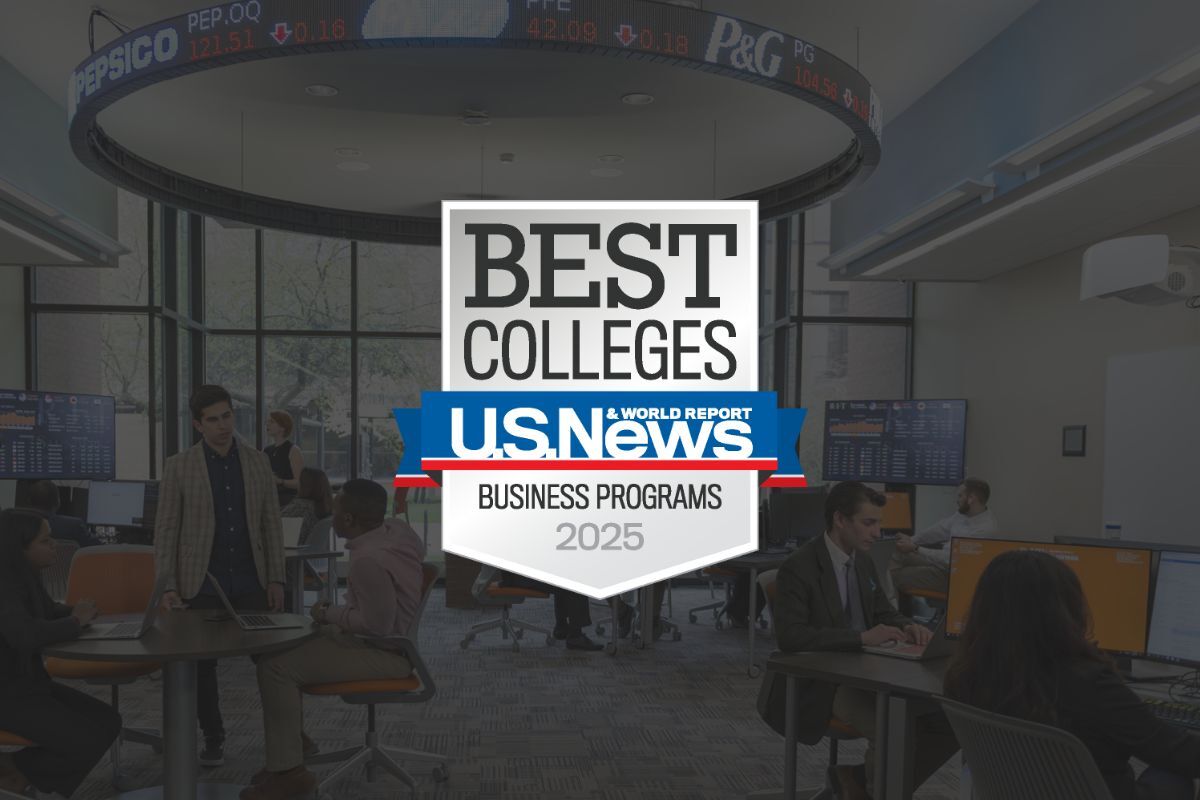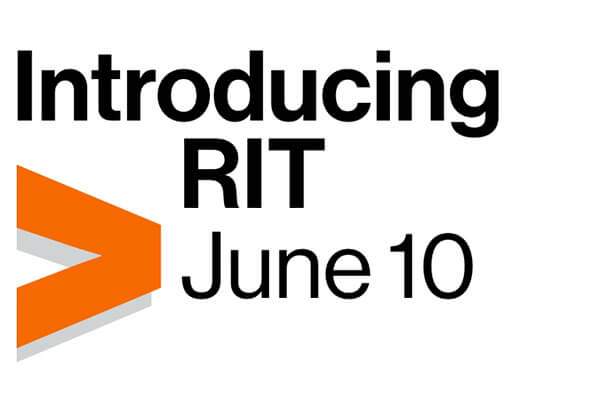Global Business Management Bachelor of Science Degree

Global Business Management
Bachelor of Science Degree
- RIT /
- Saunders College of Business /
- Academics /
- Global Business Management BS
RIT’s global business management bachelor’s degree provides you with essential skills–motivating employees, effective communication, leading regional and global teams—to become an effective leader in a global economy.
$69.3K
Average First-Year Salary of RIT Graduates from this degree
100%
Student participation in co-op
#1
Undergraduate business programs in Western New York; 67th overall nationally. U.S. News & World Report, 2021
Overview for Global Business Management BS
Why Study Global Business Management at RIT
Focused Degree Options: Choose a track in entrepreneurship, leadership, or supply chain management.
Practice Management: Motivate, communicate, execute, and lead teams effectively using solution-based thinking with peers from partner universities and RIT’s global campuses.
Global Rotation Option: Through our global business management rotation, you can gain a global perspective on business, management, and operations by spending two semesters at our global campuses in RIT Croatia or RIT Dubai.
Industry Exposure: Study the latest industry trends and software taught by top faculty and industry practitioners with leadership from the Management Advisory Board.
RIT’s BS in Global Business Management
This bachelor of science in global business management builds a T-shaped professional, who is characterized by a deep disciplinary knowledge and an understanding of the professional and personal skills that transcend disciplines. In this program, you will:
- Gain an understanding of solution-based thinking with a curriculum that features a strong emphasis on design thinking.
- Develop cross-cultural teamwork and management skills through various team projects with peers from partner universities and RIT's global campuses.
BS in Global Business Management Curriculum
The BS in global business management curriculum provides both depth and flexibility through management courses that emphasize:
- Operations management
- Strategic management
- Leading cross-cultural teams
- Communication
- Critical reasoning
In addition to a foundation in business management, you will also choose a concentration in:
- Entrepreneurship
- Leadership
- Supply chain management
Global Business Management Rotation: Study Abroad at RIT Croatia and RIT Dubai
The global business management rotation is an immersive experience in which you will participate with a cohort of students to gain a global perspective of business and commerce by studying international business on three continents:
- RIT: The majority of your course work will occur on RIT’s main campus in Rochester, N.Y.
- RIT Croatia: You’ll spend the spring semester of your second year at RIT Croatia, in Zagreb, the country's capital and a center for international trade and business.
- RIT Dubai: Spend the spring semester of your third year at the RIT Dubai's strategically located campus in Dubai Silicon Oasis, one of the world's leading business centers for advanced electronic innovation and design.
Hands-On Experience Equals Real-World Skills
Students in the global business management major have the opportunity to complete at least one semester of paid cooperative education experience. These business co-ops enable you to gain career experience in a range of industries to prepare you to become a competitive, marketable candidate for positions once you graduate.
Furthering Your Education Global Business Management
RIT’s Combined Accelerated Bachelor’s/Master’s Degrees enable you to earn both a bachelor’s and a master’s degree in as little as five years, giving you a competitive advantage.
- +1 MBA Early Acceptance Pathway: Successful RIT applicants who are offered admission into the BS degree in global business management as an incoming first-year student may also be offered conditional early acceptance into the +1 MBA Early Acceptance Pathway. This option enables you to earn both your BS degree and an MBA in as little as five years of study. Learn how the +1 MBA Early Acceptance Pathway can help you add a competitive advantage to your studies.
- +1 MBA: Students who enroll in a qualifying undergraduate degree have the opportunity to add an MBA to their bachelor’s degree after their first year of study, depending on their program. Learn how the +1 MBA can accelerate your learning and position you for success.
-
#77 Best Business Undergraduate Programs, 2025
RIT’s business degrees are ranked among the Best Undergraduate Business Programs nationally.
-
Global Rotation Option
Gain a global perspective of international business and commerce with two semesters studying at RIT Croatia and RIT Dubai.
-
Join us for a virtual admissions event
A perfect first-look for high school sophomores, juniors, and their families.
Careers and Cooperative Education
Typical Job Titles
| Appraisal Coordinator | Asset Management Analyst | Business Analyst |
| Business Management Consultant | Contracts Negotiator | Customer Service Lead |
| E-commerce manager | Financial Analyst | Private Client Associate |
| Program Manager | Project Manager | Social Media Manager |
| Sales Coordinator |
Industries
-
Advertising, PR, and Marketing
-
Consumer Packaged Goods
-
Food and Beverage
-
Health Care
-
Management Consulting
-
Retail Stores
Cooperative Education
What’s different about an RIT education? It’s the career experience you gain by completing cooperative education and internships with top companies in every single industry. You’ll earn more than a degree. You’ll gain real-world career experience that sets you apart. It’s exposure–early and often–to a variety of professional work environments, career paths, and industries.
Co-ops take your knowledge and turn it into know-how. Business co-ops provide hands-on experience that enables you to apply your knowledge of business, management, finance, accounting, and related fields in professional settings. You'll make valuable connections between course work and real-world applications as you build a network of professional contacts.
Students in the global business management degree are required to complete at least one block of cooperative education.
Featured Work and Profiles
-
Research Insights: Chinese media sets tone for polluters
Zhi Tang The mediating role of the government and public in agenda setting
Read More about Research Insights: Chinese media sets tone for polluters -
Research Insights: A strategy paradox in Swiss timekeeping
Rich DeJordy How leaders with opposing visions find a new path forward
Read More about Research Insights: A strategy paradox in Swiss timekeeping -
Southwest Airlines, Dallas, TX
Alicia Imel, co-op ’14 "So far, I’ve gotten to go to Denver, Atlanta, and Manchester and plan to go to many more places!"
Read More about Southwest Airlines, Dallas, TX -
The Walt Disney Company, Los Angeles, CA
Andre Joly "Saunders and RIT helped me look at problems and find solutions while utilizing creativity to improve processes and be more efficient."
Read More about The Walt Disney Company, Los Angeles, CA -
BMW, Spartanburg, SC
Carmyn A. Gomez, co-op ’20 "When I visited Saunders College of Business for the first time, I said to my parents, "I belong to this place." We had visited several other colleges, but I knew choosing RIT would be the right...
Read More about BMW, Spartanburg, SC
Curriculum for 2024-2025 for Global Business Management BS
Current Students: See Curriculum Requirements
Global Business Management, BS degree, typical course sequence
| Course | Sem. Cr. Hrs. | |
|---|---|---|
| First Year | ||
| ACCT-110 | Financial Accounting |
3 |
An introduction to the way in which corporations report their financial performance to interested stakeholders such as investors and creditors. Coverage of the accounting cycle, generally accepted accounting principles, and analytical tools help students become informed users of financial statements. (This course is available to RIT degree-seeking undergraduate students.) Lecture 3 (Fall, Spring, Summer). | ||
| ACCT-210 | Management Accounting |
3 |
Introduction to the use of accounting information by managers within a business. Explores the value of accounting information for the planning and controlling of operations, assessing the cost of a product/service, evaluating the performance of managers, and strategic decision making. (Prerequisites: ACCT-110 or NACC-205 or equivalent course.) Lecture 3 (Fall, Spring, Summer). | ||
| ECON-101 | Principles of Microeconomics (General Education – Global Perspective) |
3 |
Microeconomics studies the workings of individual markets. That is, it examines the interaction of the demanders of goods and services with the suppliers of those goods and services. It explores how the behavior of consumers (demanders), the behavior of producers (suppliers), and the level of market competition influence market outcomes. Lecture 3 (Fall, Spring). | ||
| ECON-201 | Principles of Macroeconomics (General Education) |
3 |
Macroeconomics studies aggregate economic behavior. The course begins by presenting the production possibilities model. This is followed by a discussion of basic macroeconomic concepts including inflation, unemployment, and economic growth and fluctuations. The next topic is national income accounting, which is the measurement of macroeconomic variables. The latter part of the course focuses on the development of one or more macroeconomic models, a discussion of the role of money in the macroeconomy, the aggregate supply-aggregate demand framework, and other topics the individual instructor may choose. (Prerequisites: ECON-101 or completion of one (1) 400 or 500 level ECON course.) Lecture 3 (Fall, Spring, Summer). | ||
| INTB-225 | Global Business Environment (General Education) |
3 |
Being an informed global citizen requires an understanding of the global business environment. Organizations critical to the development of the global business environment include for-profit businesses, non-profits, governmental, non-governmental, and supranational agencies. This course introduces students to the interdependent relationships between organizations and the global business environment. A holistic approach is used to examine the diverse economic, political, legal, cultural, and financial systems that influence both organizations and the global business environment. (This course is available to RIT degree-seeking undergraduate students.) Lecture 3 (Fall, Spring). | ||
| MATH-161 | Applied Calculus (General Education) |
4 |
This course is an introduction to the study of differential and integral calculus, including the study of functions and graphs, limits, continuity, the derivative, derivative formulas, applications of derivatives, the definite integral, the fundamental theorem of calculus, basic techniques of integral approximation, exponential and logarithmic functions, basic techniques of integration, an introduction to differential equations, and geometric series. Applications in business, management sciences, and life sciences will be included with an emphasis on manipulative skills. (Prerequisite: C- or better in MATH-101, MATH-111, MATH-131, NMTH-260, NMTH-272 or NMTH-275 or Math Placement Exam score greater than or equal to 45.) Lecture 4 (Fall, Spring). | ||
| MGIS-130 | Information Systems & Technology |
3 |
To be successful in our globally-networked business environment, contemporary management professionals must have a strong grounding in the principles of information and information technology. This course provides an introduction to the field of management information systems (MIS), including the tools and techniques for managing information and information technologies within organizations. We place a particular emphasis on the nature of systems, the role of information in business processes, the management of data, and the planning of MIS design projects. Lecture 3 (Fall, Spring). | ||
| MGMT-101 | Business 1: Introduction to Business Communication, Planning & Analysis |
3 |
This is the first of a two-course sequence, 4 credit year long experience, comprising the freshman-integrated experience. In Business 1, students will be introduced to the key functional areas of business, discuss current factors, events, and trends that impact business, build professional, personal leadership, communication, and teamwork skills, and evaluate business decisions, and the business plan process. By understanding the key functions of business and analyzing business decisions in Business 1, students will be able to then develop their own business ideas in Business 2. Lecture 3 (Fall). | ||
| MGMT-102 | Business 2: Business Planning and Professional Development |
1 |
This course, the second in the First-year Business 4 Credit Experience, applies business and technology tools to create a modified business plan. Supported by guest speakers on a variety of professional development topics, along with student and professional mentors, students in this project-centered course use the Business Model Canvas innovation tool and learn to identify and communicate the nine key elements of a business model. Students will complete a team project that outlines the business case for a new product or service to address a selected challenge or opportunity. Student teams present a business case in both a one-page document and a 10-minute presentation pitch. (Prerequisites: MGMT-101 or MGMT-150 or equivalent course.) Lecture 1 (Fall, Spring). | ||
| STAT-145 | Introduction to Statistics I (General Education – Mathematical Perspective A) |
3 |
This course introduces statistical methods of extracting meaning from data, and basic inferential statistics. Topics covered include data and data integrity, exploratory data analysis, data visualization, numeric summary measures, the normal distribution, sampling distributions, confidence intervals, and hypothesis testing. The emphasis of the course is on statistical thinking rather than computation. Statistical software is used. (Prerequisites: Any 100 level MATH course, or NMTH-260 or NMTH-272 or NMTH-275 or (NMTH-250 with a C- or better) or a Math Placement Exam score of at least 35.) Lecture 3 (Fall, Spring, Summer). | ||
| YOPS-10 | RIT 365: RIT Connections |
0 |
RIT 365 students participate in experiential learning opportunities designed to launch them into their career at RIT, support them in making multiple and varied connections across the university, and immerse them in processes of competency development. Students will plan for and reflect on their first-year experiences, receive feedback, and develop a personal plan for future action in order to develop foundational self-awareness and recognize broad-based professional competencies. (This class is restricted to incoming 1st year or global campus students.) Lecture 1 (Fall, Spring). | ||
General Education – First Year Writing (WI) |
3 | |
| Second Year | ||
| BANA-255 | Data Literacy, Analytics, and Decision Making (General Education) |
3 |
This course serves as an introduction to the uses (and potential misuses) of data in a wide variety of social settings, including the exploration of contemporary techniques to analyze such data. Data acquisition, cleansing, management, analysis, and visualization will be addressed through hands-on projects. Project work will include contemporary social problems addressed using a dynamic set of resources and technologies. An emphasis will be placed on how insights gleaned from data analysis can be used to guide individual and group decision-making scenarios. Lecture 3 (Fall, Spring). | ||
| COMM-253 | General Education – Elective: Communication (General Education) |
3 |
An introduction to communication contexts and processes emphasizing both conceptual and practical dimensions. Participants engage in public speaking, small group problem solving and leadership, and writing exercises while acquiring theoretical background appropriate to understanding these skills. Lecture 3 (Fall, Spring). | ||
| FINC-220 | Financial Management |
3 |
Basic course in financial management. Covers business organization, time value of money, valuation of securities, capital budgeting decision rules, risk-return relation, Capital Asset Pricing Model, financial ratios, global finance, and working capital management. (Prerequisites: (ECON-101 or ECON-201) and ACCT-110 and (STAT-145 or STAT-251 or CQAS-251 or MATH-251 or MATH-252 or STAT-205) or equivalent courses.) Lecture 3 (Fall, Spring, Summer). | ||
| MGMT-215 | Organizational Behavior |
3 |
As an introductory course in managing and leading organizations, this course provides an overview of human behavior in organizations at the individual, group, and organizational level with an emphasis on enhancing organizational effectiveness. Topics include: individual differences, work teams, motivation, communication, leadership, conflict resolution, organizational culture, and organizational change. (This class is restricted to undergraduate students with at least 2nd year standing.) Lecture 3 (Fall, Spring, Summer). | ||
| MGMT-340 | Business Ethics and Corporate Social Responsibility (General Education - Ethical Perspective) |
3 |
This course applies concepts of ethics to business at the macro level and at the micro level. At the macro level the course examines competing business ideologies exploring the ethical concerns of capitalism as well as the role of business in society. At the micro level the course examines the role of the manager in establishing an ethical climate with an emphasis on the development of ethical leadership in business organizations. The following topics are typically discussed: the stakeholder theory of the firm, corporate governance, marketing and advertising ethics, the rights and responsibilities of employees, product safety, ethical reasoning, business's responsibility to the environment, moving from a culture of compliance to a culture of integrity, and ethical leadership. (This class is restricted to undergraduate students with at least 2nd year standing.) Lecture 3 (Fall, Spring). | ||
| MKTG-230 | Principles of Marketing |
3 |
An introduction to the field of marketing, stressing its role in the organization and society. Emphasis is on determining customer needs and wants and how the marketer can satisfy those needs through the controllable marketing variables of product, price, promotion and distribution. (This class is restricted to undergraduate students with at least 2nd year standing.) Lecture 3 (Fall, Spring, Summer). | ||
| SCBI-035 | Careers in Business |
0 |
This course consists of a series of workshops designed to introduce business students to the skills needed to be successful in job and coop searches and applications to graduate schools. Students will establish their career goals, create material (e.g., resume, cover letter), and acquire skills needed to achieve these goals. (AL2,3,4-DegS) Lecture 3 (Fall, Spring). | ||
| STAT-146 | Introduction to Statistics II (General Education – Mathematical Perspective B) |
4 |
This course is an elementary introduction to the topics of regression and analysis of variance. The statistical software package Minitab will be used to reinforce these techniques. The focus of this course is on business applications. This is a general introductory statistics course and is intended for a broad range of programs. (Prerequisites: STAT-145 or equivalent course.) Lecture 6 (Fall, Spring, Summer). | ||
General Education – Artistic Perspective |
3 | |
Global Business Management Elective |
3 | |
Open Elective |
3 | |
| Third Year | ||
| DECS-310 | Operations Management |
3 |
A survey of operations and supply chain management that relates to both service- and goods- producing organizations. Topics include operations and supply chain strategies; ethical behavior; forecasting; product and service design, including innovation and sustainability; capacity and inventory management; lean operations; managing projects; quality assurance; global supply chains; and the impacts of technology. (Prerequisites: STAT-145 or MATH-251 or equivalent courses.) Lecture 3 (Fall, Spring, Summer). | ||
| DECS-350 | Project Management |
3 |
A study of the concepts and applications of project management. This course covers the organization and management of projects, including the role and responsibilities of the project manager, team responsibilities, tools and techniques for project planning, budgeting, and control, work breakdown, risk assessment, and project termination. The learning environment will include lectures and discussion, group exercises, case studies, and examinations. (This class is restricted to undergraduate students with at least 3rd year standing.) Lecture 3 . | ||
| MGMT-310 | Leading Cross-Cultural & Virtual Teams (WI-PR) |
3 |
Taught in an experiential, team-based format, this class focuses on leading cross cultural and virtual teams, with an emphasis on developing strong team dynamics for effective performance in a global environment. Thus, class topics will center around understanding team development and leading teams, while considering varying relevant factors such as cultural differences, virtual communication, managing conflict, and team climate/trust, among others. The course will provide hands-on experience in leading and participating in teams as students will be assigned to a team and will take on different roles, including team leader. When possible, the class includes a virtual team project with students at RIT’s global campuses. (Prerequisites: MGMT-215 or equivalent course.) Lecture 3 (Fall, Spring). | ||
| Choose one of the following: | 3 |
|
| HRDE-386 | Human Resources Development |
|
A one-semester, three-credit course in human resource development provides the prospective manager practical information on methods to enhance the productivity, quality, and effectiveness of an organization through the creation of an environment where individual and collective performance and development has primacy. The course requires students to assimilate course material related to the following: to organizational strategy, systems thinking and legal compliance; workforce development, career development of employees; individual development and training; measuring outcomes; human resource processes and effective communications. Students integrate theoretical classroom concepts with practical knowledge and work experiences. As part of the course: students continually practice effective communication skills; students may work in teams; and are expected to engage in critical and innovative thinking. Students' understanding of human resource development is intended to help them enhance organizational effectiveness through implementing processes designed to develop and train employees. Lecture 3 (Fall, Spring). | ||
| MGMT-450 | Negotiations and Decision-Making |
|
This course is designed to improve your ability to negotiate by understanding decision-making biases that affect the negotiated outcome. Individual sessions will explore the structure and strategies to mitigate risks and challenges inherent in achieving optimal solutions. (Prerequisites: MGMT-215 or equivalent course.) Lecture 3 (Spring). | ||
| Choose one of the following: | 0 |
|
| INTB-499 | International Business Co-op (summer) |
|
One semester of paid work experience in International Business (This class is restricted to undergraduate students with at least 3rd year standing.) CO OP (Fall, Spring, Summer). | ||
| MGMT-499 | Management Co-op (summer) |
|
One semester of paid work experience in management. (This class is restricted to undergraduate students with at least 3rd year standing.) CO OP (Fall, Spring, Summer). | ||
Global Business Management Elective |
3 | |
General Education – Immersion 1, 2 |
6 | |
General Education – Natural Science Inquiry Perspective † |
3 | |
General Education – Scientific Principles Perspective |
3 | |
Open Elective |
3 | |
| Fourth Year | ||
| INTB-550 | Competing Globally |
3 |
This course explores the opportunities and challenges businesses encounter creating and capturing value in the global environment. Areas of emphasis include: forecasting markets; why firms globalize; analyzing global competitors; the degree of globalization or regionalization; creating value for the firm globally which includes entry mode management, location decisions and timing, role of technology; and how to operate. (Prerequisites: INTB-225 or equivalent course and 4th year standing.) Lecture 3 (Spring). | ||
| MGMT-560 | Strategic Management |
3 |
A capstone course drawing upon major business functions—accounting, finance, marketing, operations management, and organizational theory and how strategic managers integrate functional theories and concepts to create competitive advantage. The course provides an integrated perspective of business organizations toward the achievement of enhanced profitability and a sustainable competitive advantage. Topics include the analysis of business environments, industry attractiveness, and competitive dynamics. Students learn how to formulate and implement effective business-level, corporate-level, and global strategies using theories, cases and a simulation. (Prerequisites: MGMT-215 and MKTG-230 and FINC-220 and DECS-310 or equivalent courses.) Lecture 3 (Fall, Spring, Summer). | ||
General Education - Social Perspective |
3 | |
General Education – Electives |
9 | |
General Education – Immersion 3 |
3 | |
Global Business Management Elective |
3 | |
Open Electives |
6 | |
| Total Semester Credit Hours | 123 |
|
Please see General Education Curriculum (GE) for more information.
(WI) Refers to a writing intensive course within the major.
Please see Wellness Education Requirement for more information. Students completing bachelor's degrees are required to complete two different Wellness courses.
† Students will satisfy this requirement by taking either a 3 or 4 credit hour lab science course. If a science course consists of separate lecture and laboratory sections, students must take both the lecture and lab portions to satisfy the requirement.
Approved Global Business Management Electives
| COMM-304 | Intercultural Communication |
|
Intercultural communication provides an examination of the role of culture in face-to-face interaction. Students may find a basic background in communication, anthropology, or psychology useful. Lecture 3 (Fall or Spring). | ||
| DECS-435 | Supply Chain Management Fundamentals |
|
This course introduces the basic concepts in supply chain management fundamentals as well as strategies and practice, and examines important managerial issues. Topics covered include forecasting, inventory management, third-party logistics, partnering, contracts, event management and conflict resolution, e-business, and strategy. (Prerequisites: DECS-310 or equivalent course.) Lecture 3 . | ||
| FINC-420 | International Finance |
|
Discusses the problems posed by the international financial environment in which corporations operate. In particular, students learn to quantify and manage risks arising from shifting exchange rates. Other topics include exchange rate systems, international trade finance, international capital budgeting, country risk analysis, and long-term international financing. (Prerequisites: FINC-220 or equivalent course.) Lecture 3 (Fall, Spring, Summer). | ||
| INTB-315 | Exporting and Global Sourcing |
|
The practice of international business is detailed-oriented and complex as cross-border trade and investment is subject to various market forces and government regulations. In this course students will study the issues of compliance, risk assessment, sources of international information, logistical complexities and intermediaries, and international payments and financing. The course will develop students with the necessary knowledge base and skills to become successful in the practice of cross border transactions. (Prerequisites: INTB-225 or equivalent course.) Lecture 3 (Fall, Spring). | ||
| INTB-480 | Specialized Topics in Global Business |
|
This course is designed to educate students on how to conduct business in a foreign region or a global industry in depth. After taking this class, students should have a thorough understanding of how to conduct business associated with this specific region or the global industry. (This class is restricted to undergraduate students with at least 2nd year standing.) Lecture 3 (Spring). | ||
| INTB-489 | Seminar in International Business |
|
Current issues in IB are the focus of the course. Topics include but not are limited to current international business trends, development, and other topics at the instructor's discretion. (Prerequisites: INTB-225 or equivalent course and 3rd year standing.) Lecture 3 (Fall). | ||
| MGIS-360 | Building a Web Business |
|
This course gives students both a conceptual and hands-on understanding of the launching of web businesses. Students will study the full process of web business creation, including domain name registration, frameworks for application creation, hosting of web applications and search engine optimization. Students will apply their knowledge by designing and building a business website that can actually make money. Lecture 3 (Fall, Spring). | ||
| MGIS-429 | Cyber: Risk and Resilience |
|
This course provides a conceptual and practical overview of Cybersecurity Management. A keen awareness of the principles and procedures of cybersecurity is a management necessity with universal business implications. Success in today's global economy requires a focus on cybersecurity strategy and management with governance as an overarching consideration in all risk assessment and management related endeavors. Lecture 3 (Fall, Spring). | ||
| MGMT-330 | Design Thinking and Concept Development |
|
Design thinking is a process that aids collaboration among designers, technologists, and business professionals. The process provides a structured creative process for discovering and developing products, services, and systems for profit and non-profit applications. Students will apply a wide range of design tools in a hands-on project. Topics include problem-framing, end-user research, visualization, methods for creative idea generation, and prototyping. (This class is restricted to undergraduate students with at least 3rd year standing.) Lecture 3 (Fall, Spring). | ||
| MGMT-350 | Entrepreneurship |
|
This course studies the process of creating new ventures with an emphasis on understanding the role of the entrepreneur in identifying opportunities, seeking capital and other resources, and managing the formation and growth of a new venture. It addresses the role of entrepreneurship in the economy and how entrepreneurial ventures are managed for growth. (This class is restricted to undergraduate students with at least 3rd year standing.) Lecture 3 (Fall, Spring, Summer). | ||
| MGMT-470 | Applied Entrepreneurship and Commercialization |
|
This unique undergraduate course enables students to learn the entrepreneurial (value creation) process by advancing a business idea. The course provides weekly seminars focusing on customer discovery and business model development and weekly coaching mentoring sessions with an established entrepreneur/early stage marketer. The project is team based. Students may enter the course with a business concept or be integrated into an existing team in the course. Lecture 3 (Fall, Spring, Summer). | ||
| MGMT-489 | Seminar in Management |
|
Special-topics seminars offer an in-depth examination of current events, issues and problems unique to management. Specific topics will vary depending upon student and faculty interest and on recent events in the business world. Seminar topics for a specific semester will be announced prior to the course offering. These seminars may be repeated for credit since topics normally vary from semester to semester. (topic-dependent) Lecture 3 . | ||
| MKTG-320 | Digital Marketing |
|
Internet marketing is critical to an organization's overall strategy. This course focuses on tactics and strategies that enable marketers to fully leverage the internet. Topics include the overall internet marketing landscape, technologies, customer segmenting and targeting, search, analytics and emerging internet-marketing platforms. (Prerequisites: MKTG-230 or NBUS-227 or equivalent course.) Lecture 3 (Fall, Spring). | ||
| MKTG-330 | Global Marketing |
|
A hands-on course focusing on developing marketing strategies for entering and competing in foreign countries. Topics include foreign market opportunity assessment, developing commercialization and entry strategies, understanding foreign customers and distribution channels, and communicating value through advertising and promotion in different markets. (Prerequisites: MKTG-230 or equivalent course.) Lecture 3 (Fall, Spring). | ||
| MKTG-365 | Marketing Analytics |
|
Marketing analytics is the practice of measuring, managing and analyzing marketing performance to maximize its effectiveness and optimize return on investment (ROI). Understanding marketing analytics allows marketers to be more efficient at their jobs and minimize wasted online and offline marketing dollars. It also provides marketers with the information necessary to help support company investment in marketing strategy and tactics.
This course provides the participant with the necessary knowledge and practical insights that will help a marketing manager get more out of available data and take strategic advantage of the analysis. This interactive, participatory course is designed to answer key questions: “What is marketing analytics, how can marketing analytics improve my marketing efforts and how can I integrate marketing analytics into my business? (Prerequisites: MKTG-230 and STAT-145 or equivalent courses.) Lecture 3 (Fall, Spring). | ||
Admissions and Financial Aid
First-Year Admission
First-year applicants are expected to demonstrate a strong academic background that includes:
- 4 years of English
- 3 years of social studies and/or history
- 3 years of math is required and must include algebra, geometry, and algebra 2/trigonometry. Pre-calculus is preferred.
- 2-3 years of science
Transfer Admission
Transfer applicants should meet these minimum degree-specific requirements:
- A minimum of college algebra is required. Pre-calculus or calculus is preferred.
Financial Aid and Scholarships
100% of all incoming first-year and transfer students receive aid.
RIT’s personalized and comprehensive financial aid program includes scholarships, grants, loans, and campus employment programs. When all these are put to work, your actual cost may be much lower than the published estimated cost of attendance.
Learn more about financial aid and scholarships
Accreditation
Saunders College of Business undergraduate and graduate programs are fully accredited by the Association to Advance Collegiate Schools of Business (AACSB) International, the premier accrediting organization for business schools. Less than 5 percent of the institutions granting business degrees have received this accreditation.
Related News
-
March 25, 2025

Business student finishes first for racing scholarship
Global business management student Kelsey Pinkowski and racing icon Danica Patrick now have something in common. They both won the prestigious Gorsline Scholarship, which honors outstanding up-and-coming drivers in the racing community.
-
January 6, 2025

Mental fitness: Why physical exercise is always a great resolution
Spectrum News speaks to RIT student Alec Waight-Morabito about the importance of mental and physical health.
-
November 12, 2024

New minor bridges gaps between property development and management
RIT’s new real estate in hospitality minor gives students the opportunity to connect real estate knowledge with hospitality management practices. Launched in fall 2023, this minor is designed to equip students with specialized skills for careers in both industries.
Contact
- Melissa Masline
- Assistant Director Student Services
- Student Services
- Saunders College of Business
- 585‑475‑6571
- menglish@saunders.rit.edu
Saunders College of Business





















